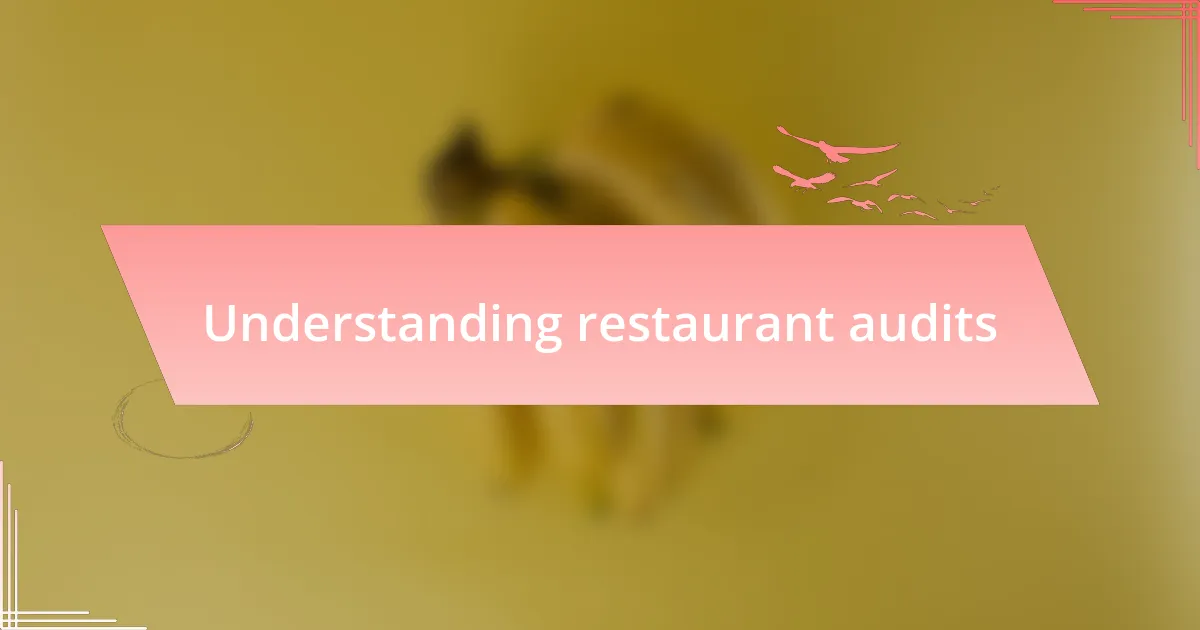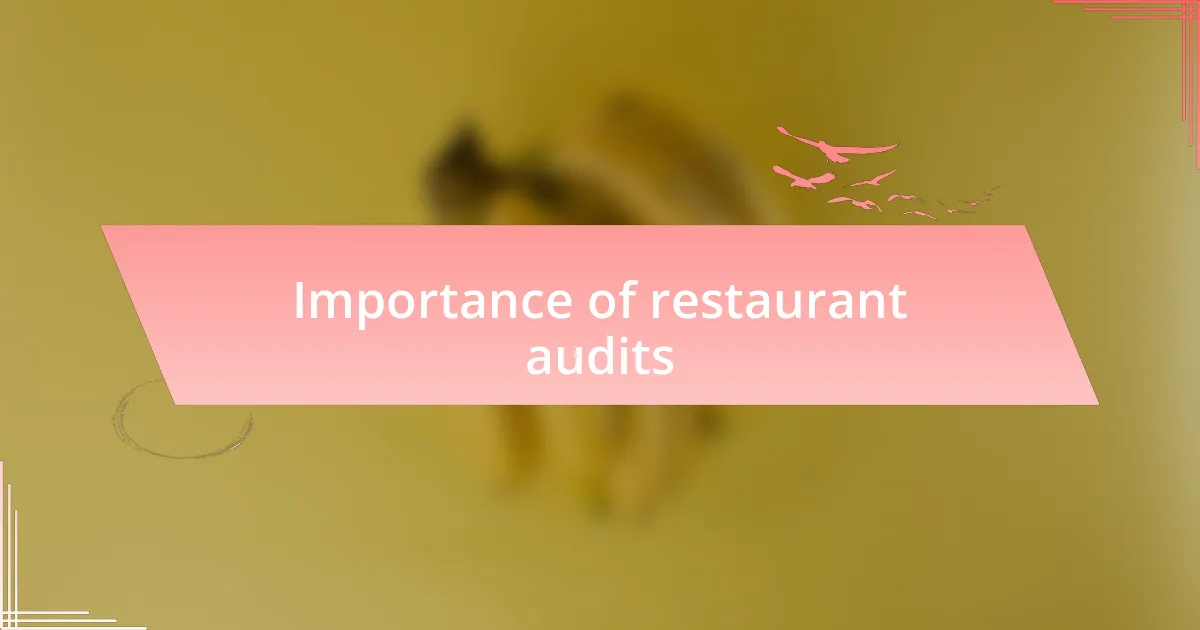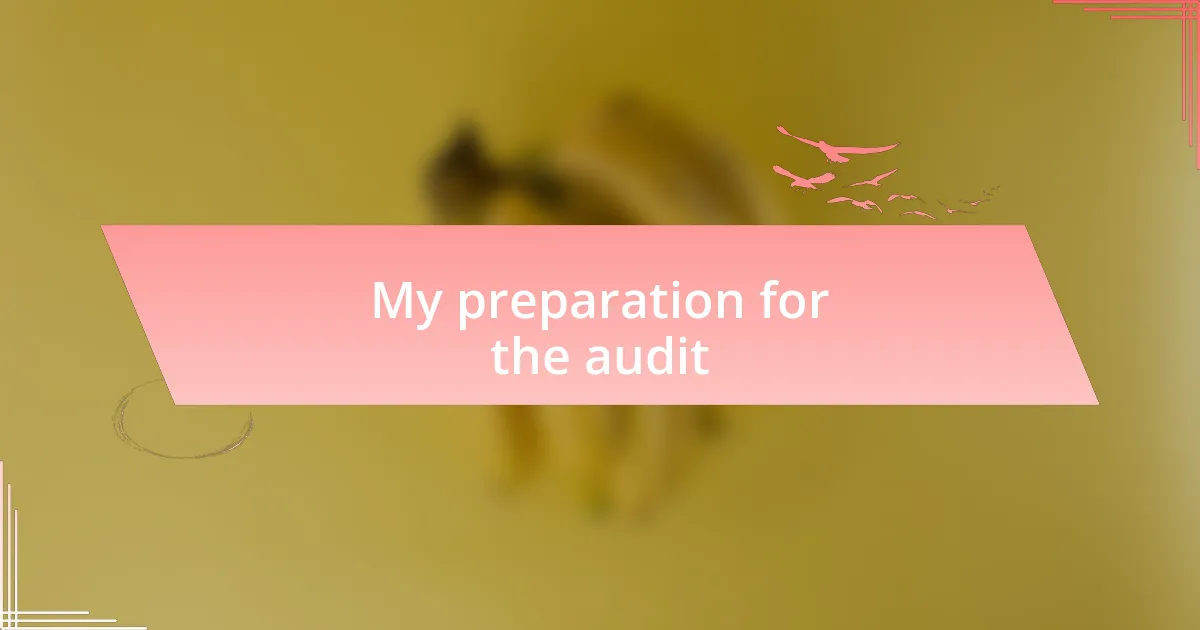Key takeaways:
- A restaurant audit is essential for ensuring food safety, operational standards, and fostering a culture of improvement among staff.
- Audits uncover hidden strengths and weaknesses, prompting necessary discussions and changes that enhance employee morale and customer satisfaction.
- Preparing for an audit requires team collaboration and attention to detail, fostering a sense of pride and shared responsibility among staff.
- Long-term benefits of regular audits include increased customer satisfaction, accountability, and informed decision-making that drives profitability.

Understanding restaurant audits
A restaurant audit is a thorough examination of various aspects of a restaurant’s operations, including food safety, sanitation, and compliance with regulations. I remember my first experience observing an audit; the tension in the air was palpable. It made me realize just how critical these assessments are for maintaining not only standards but also the reputation of the business.
During an audit, it’s not just about checking off boxes; it’s an opportunity to delve deep into the heart of the operation. For instance, I once noticed how the auditor uncovered issues with inventory management that had been overlooked. Have you ever considered how much a simple review could elevate a restaurant’s efficiency and customer satisfaction? It truly drives home the point that audits are not just procedural but essential to nurturing a thriving food business.
Understanding restaurant audits goes beyond surface-level compliance. When I reflected on the insights gained from an audit, I realized it can be a catalyst for a culture of improvement and accountability. The feedback provided can empower staff and management alike to strive for excellence. How can we view audits not as a chore, but rather as an invaluable tool for growth? This perspective shift can lead to significant positive changes within the restaurant environment.

Importance of restaurant audits
When I think about the importance of restaurant audits, I remember a specific instance where a simple oversight nearly cost a restaurant its five-star rating. The auditor’s keen eye caught a minor yet critical lapse in food temperature checks. This not only protected the customers but also reinforced the idea that maintaining operational standards is vital. Are audits the unsung heroes of maintaining quality in the food industry? I believe they are.
Audits serve as a mirror reflecting the true state of a restaurant. I recall a time when an audit revealed discrepancies in our waste management system. The findings prompted meaningful conversations about sustainability among the staff. This experience made me realize how auditors can spark conversation and drive necessary change. Isn’t it fascinating how a single audit can lead to collective growth and improve both employee morale and customer trust?
Moreover, the emotional impact of an audit often goes unnoticed. I once witnessed a team that, after receiving constructive criticism during an audit, felt a renewed sense of purpose. They embraced changes with enthusiasm because they realized their commitment to excellence was recognized and valued. How often do we take a moment to appreciate the potential for growth that comes from a thorough assessment? It’s this emotional connection and the drive for improvement that truly underscores the importance of restaurant audits.

My preparation for the audit
Preparing for the audit was a pivotal moment, and I took it quite seriously. I started by organizing the kitchen and dining areas, ensuring every station was in top shape. I remember feeling a mix of excitement and nervousness; it was an opportunity to showcase our hard work, but there was also that lingering doubt. Would everything hold up under scrutiny?
Next, I reviewed our standard operating procedures. I wanted to make sure that every team member was on the same page. I gathered the staff for a brief meeting to discuss expectations, and I can still picture the nods of agreement and the occasional anxious smile. How could I not feel hopeful as we all rallied together, aiming for perfection in our practices?
Of course, a thorough check of our inventory was essential. I found myself taking stock not just of the ingredients but of the morale in the kitchen as well. It struck me how this preparation became a team-building exercise; we were all invested in the outcome. Ultimately, I realized that preparing for an audit is as much about the condition of the restaurant as it is about cultivating a shared sense of responsibility and pride.

Insights gained from the audit
It’s fascinating how an audit can uncover unseen strengths and weaknesses within a restaurant. Personally, I was surprised to find that the area we thought was our weakest—the front-of-house service—actually had the highest compliance with our standards. This experience made me realize that sometimes we underestimate our team’s ability to shine under pressure. Isn’t it amazing how people can rise to the occasion when they know the spotlight is on them?
During the audit, I learned that communication is crucial to running a smooth operation. One moment stood out: our inspector emphasized how essential clear signage is in the kitchen. I had always viewed it as mere decoration, but this audit highlighted that good communication could prevent errors and streamline service. Reflecting on that, I found myself asking, how many other simple changes could we make for massive impacts?
Another insightful moment came when we received feedback on our menu presentation. I remember feeling a little defensive at first, thinking, “But our guests love it!” However, I quickly learned that feedback, even when it’s hard to hear, is a gift. Embracing this perspective opened my eyes to the power of continuous improvement. After all, isn’t the goal to create an extraordinary dining experience?

Actions taken post audit
After the audit, we took immediate action to address the highlighted areas for improvement. For instance, I implemented a weekly staff training session focused on communication skills, which has already begun to show positive results. It’s remarkable to see the transformation in our team’s interactions—it feels like a breath of fresh air.
One change that surprised me was our decision to revamp the signage in the kitchen. Initially, I hesitated, thinking it was a minor detail. However, watching our team embrace this change was eye-opening. The clearer signage not only reduced confusion but also boosted morale as staff felt more empowered and informed while navigating their tasks. Isn’t it incredible how a simple adjustment can create such a ripple effect?
Lastly, we revamped our menu presentation based on the feedback we received. I remember being skeptical at first, but seeing the guests’ reactions to the new layout was worth every effort. Their enthusiasm was contagious—who knew that a fresh design could elevate their dining experience so significantly? Reflecting on this journey, I can’t help but feel that sometimes, it takes a critical eye and a willingness to adapt to truly unlock a restaurant’s potential.

Long term benefits of auditing
The long-term benefits of auditing extend far beyond immediate improvements. For instance, after addressing issues identified in our audit, I noticed a significant increase in customer satisfaction over time. It’s fascinating how a thorough evaluation can lead to lasting enhancements in service quality that leave guests eager to return.
One aspect I truly value is the culture of accountability that develops from regular audits. I once witnessed a staff member take ownership of their role following feedback from an audit. This shift not only improved their performance but inspired others to follow suit. Isn’t it amazing how an environment that encourages self-reflection can transform a team’s dynamics?
Moreover, consistent auditing allows for the identification of trends and patterns that can inform future decision-making. I recall a time when our audit revealed fluctuations in inventory management, which prompted us to develop better purchasing strategies. This proactive approach not only reduced waste but ultimately increased profitability. When you think about it, a restaurant’s success is often tied to its ability to adapt, and audits provide the essential insights needed for that evolution.